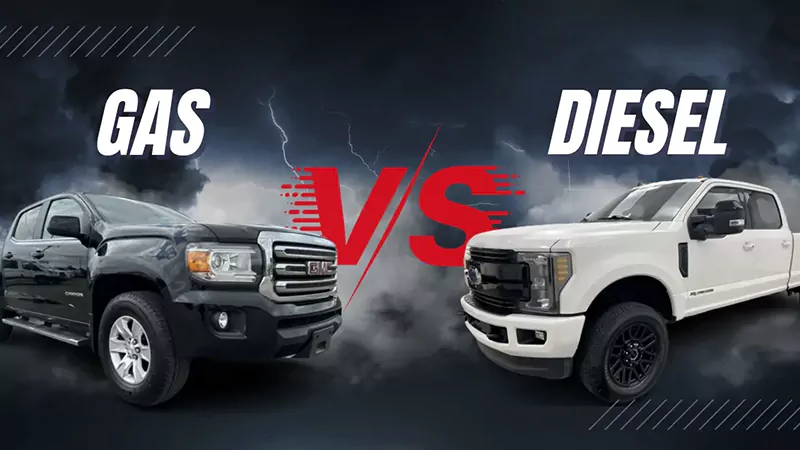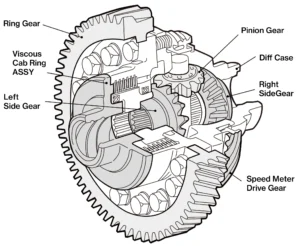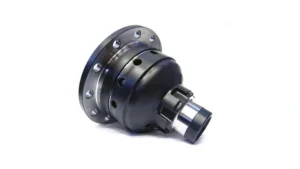This article discusses an interesting topic: between diesel and gasoline vehicles, which one is more suitable for long-distance travel and off-road use?

Actually, both types have their own pros and cons. Their performance varies under different terrain and climate conditions. Although I currently drive a diesel vehicle and so does David, that doesn’t mean you must choose diesel too.
Today, let’s list out the pros and cons of diesel and gasoline vehicles, and make a comparison for everyone. This way, you’ll see whether diesel or gasoline suits you better.
Advantages of Diesel Vehicles
High torque and strong off-road capability
Many trucks use diesel engines because they produce very high torque. When off-roading, especially climbing steep hills, rocks, or navigating complex terrains, low-speed and high-torque engines are essential. Diesel engines usually deliver peak torque around 1500–2000 RPM, which is perfect for low-speed off-road use and recovery situations.
Durable and rugged
Diesel engines use compression ignition instead of spark ignition, which requires a stronger structure. As a result, diesel engines last longer. Many can easily run for 700,000–800,000 km, lasting over a decade. Plus, diesel engines have simpler structures and fewer electrical components like spark plugs, so they’re more reliable.
Higher resale value
Due to their durability, diesel vehicles hold their value well. Even after tens of thousands of kilometers, the price drop isn’t significant.
Strong engine braking
Diesel engines have high compression ratios, which leads to strong engine braking. When going down a steep hill, just engage low-range 4WD in first gear, and the vehicle will slowly crawl down on its own with little need for braking.
Better fuel efficiency
Diesel has a higher energy density, and diesel engines are more fuel-efficient than gasoline ones. Fuel consumption is typically 20%–30% lower.
Disadvantages of Diesel Vehicles
Noisier
Diesel engines are known for louder mechanical noise—no need to explain further.
More pollution
Diesel combustion can produce particulate matter. Despite the use of DPF (Diesel Particulate Filter), pollution is still a concern. And once the DPF gets clogged, it can be troublesome.
Higher price
For the same configuration, diesel versions are more expensive—both new and used.
Costlier maintenance
Servicing diesel vehicles is more expensive.
Less suitable for cold climates
Diesel fuel can gel in low temperatures and clog fuel lines. You’ll need anti-gel additives or low-temp diesel, making winter use more complicated.
Advantages of Gasoline Vehicles
Quieter
More comfortable driving experience due to lower engine noise.
Lower purchase and maintenance costs
Ideal for those on a tighter budget.
Lighter engine
Gasoline engines are lighter than diesel ones, making the overall vehicle lighter. This sometimes makes gasoline vehicles more agile off-road.
Better cold-weather adaptability
Gasoline doesn’t gel in low temperatures, so it’s easier to use in winter.
Disadvantages of Gasoline Vehicles
Lower torque, less capable of towing
Towing trailers or RVs is more strenuous for gasoline vehicles.
Higher fuel consumption
For the same car, gasoline engines generally use more fuel than diesel.
Faster depreciation
After a few years and high mileage, gasoline vehicles lose value more quickly.
Poor low-speed off-road capability
Peak torque comes at higher RPM, requiring more revs. This makes low-speed off-road control harder and can cause stalling when climbing.
Higher exhaust temperatures
Gasoline engines produce hotter exhaust. Parking in grassy areas can be risky, as dry grass might ignite. Diesel vehicles with active DPF regeneration also face this risk.
Special Situations
- Water crossings: Diesel vehicles are better due to their simpler structure and less risk of short-circuiting.
- Driving on sand: Gasoline vehicles perform better thanks to higher power and smaller torque, making it less likely to dig into the sand.
Conclusion
So, which is better for long-distance travel and off-road use—gasoline or diesel?
It really depends on your needs. If you frequently go on expeditions, tow trailers, or face complex off-road conditions, a diesel vehicle is probably your best bet. But if you’re just doing occasional off-roading and don’t want to deal with DPF systems, a gasoline vehicle is more than enough.



